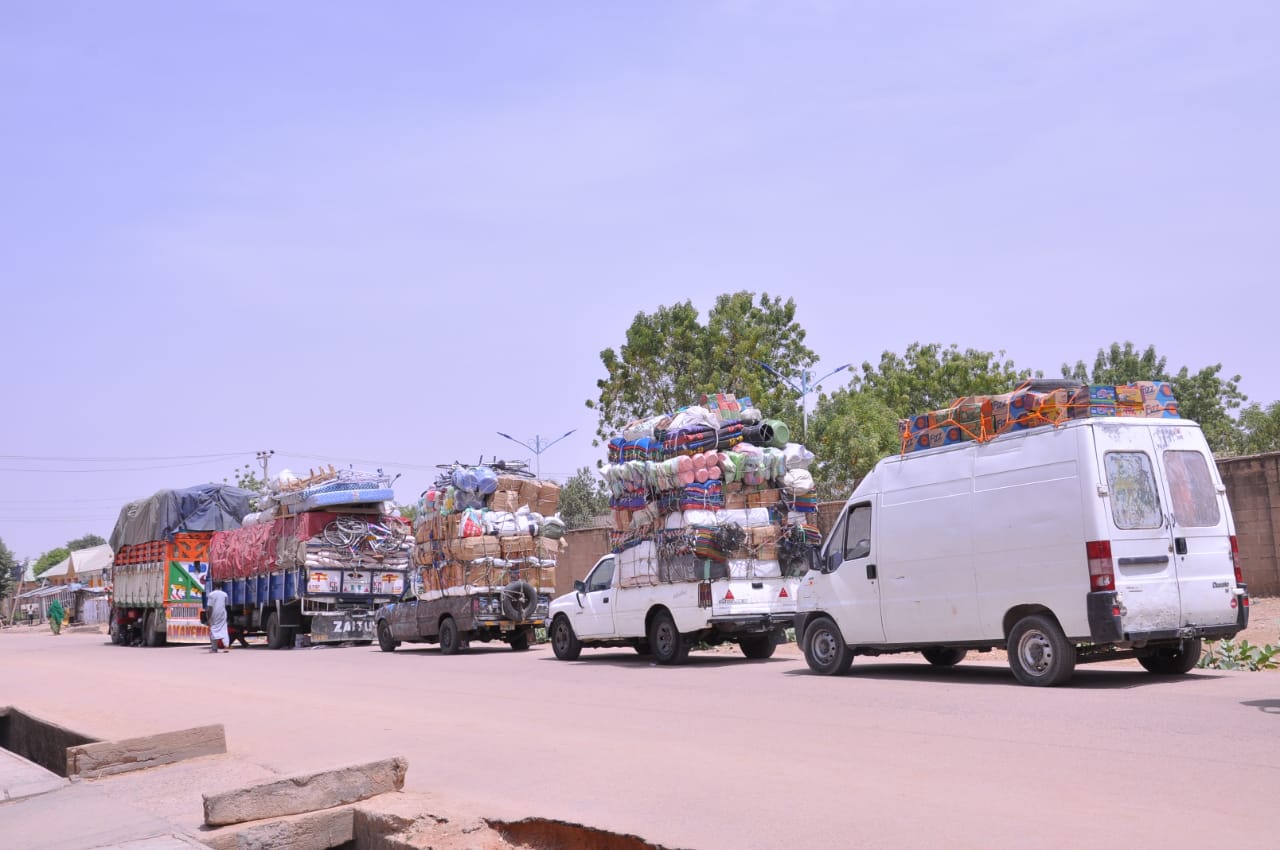
Food smuggling: FG intercepts 141 grain trucks, drivers threaten strike over attacks
The Federal Government announced on Tuesday that it has so far stopped 141 trucks trying to smuggle grains and other necessities into the Niger Republic, Chad, Cameroon, and the Central African Republic as part of ongoing efforts to solve the food inflation and cost of living issue.
According to Nigeria Customs Service Comptroller-General Bashir Adeniyi, the agency has apprehended over 120 trucks that were smuggling food goods out of the country in the last two weeks, and on Tuesday, the Economic and Financial Crimes Commission stopped 21 food trucks from leaving the nation.
Truck drivers, who have been attacked by thugs, had threatened to go on strike if the CG didn't reveal the steps being taken to guarantee food security in the House of Representatives in Abuja on Tuesday.
A number of vehicles and warehouses, primarily belonging to manufacturers and other members of the organised private sector, have been targeted by criminals as the nation's food inflation and cost of living crises worsened.
In the Suleja region of Niger State, last week, a group of young people stole food goods from trucks that were stopped in traffic on the Kaduna Road.
Hoodlums looted rice, cereals, and other humanitarian supplies from an Agricultural and Rural Development Secretariat warehouse in the Dei-Dei neighbourhood of the capital city on Sunday. The facility is owned by the Federal Capital Territory Administration.
In addition, a large group of miscreants invaded another warehouse in the Idu Industrial Estate in Jabi, Abuja, but the soldiers manning the building repulsed them.Likewise, an additional group of youths attacked trucks conveying building materials and spaghetti in Ogun and Kaduna states on Saturday and Sunday, respectively.
Aware of this unsavoury development, the organised private sector issued a warning that the attacks might force the closure of businesses nationwide.
During the sectoral debate series, Customs CG Adeniyi briefed federal lawmakers on the implementation of President Bola Tinubu's directive to reduce food smuggling. Tinubu directed that the trucks that were arrested be redirected to the local markets in the vicinity of their arrest, with the aim of driving down the cost of cereals and other food items.
120 food trucks
"About 120 trucks carrying food heading out of the country were detained by us in a span of two weeks. These are the foodstuffs that the President has requested we return to the nearby marketplaces where the arrests were made. We think that this will drive down the price of food items in these places,” he added.
He stated that the decision to halt the smuggling of food items was to fight hunger and not encourage those who wanted to enrich themselves at the expense of the people.
In order to alleviate the country's food scarcity, he cautioned against using hasty fixes and insisted that long-term solutions must be implemented.
Adeniyi noted that most agricultural inputs presently had zero duty and value-added tax, explaining that the Customs was doing their thing to ensure that the issue of food security was handled.
The CG stated that the service was forced to start the programme outside of Lagos State in order to draw lessons from the experience of auctioning off confiscated food goods in Lagos.
During the auction of rice bags that the NCS had taken from smugglers, there was a stampede that resulted in the deaths of about seven people at the NCS Old Zonal Headquarters in the Yaba neighbourhood of Lagos State last month.
The officials had to call off the exercise due to the event.
Bringing the parliamentarians up to date on the public auction, Adeniyi stated that President Tinubu had given the NCS the authority to auction off food products intercepted at the Nigerian borders to vulnerable Nigerians. He also mentioned that the program's execution had begun in Lagos but had been halted.
Adeniyi went on to say that the President had ordered the confiscated food to be sold in local markets around the country.
"Mr. President has directed that we sell food items produced locally but which were seized directly to needy Nigerians," he stated. This is one strategy to combat the current state of hunger and food scarcity. This is where we started in Lagos.
Additionally, the President has ordered that imported food items be confiscated by the Nigeria Customs Service should be sold back to the local markets for resale to Nigerians.”
Fielding questions from lawmakers during the session presided over by Deputy Speaker, Benjamin Kalu, Adeniyi gave reasons why the auction of seized grains was temporarily discontinued by the NCS.
We began in Lagos, but you are aware of what transpired. The stampede occurred. It won't matter how many bags of rice you sell or distribute; there will never be enough.
"We must concentrate on one location at a time. When we return, we'll apply the knowledge we gained in Lagos to manage this plan," he declared.
Operatives of the EFCC's Maiduguri zonal command have detained 21 trucks carrying food and non-food products that were being transported to N'djamena, the Chad Republic, the Central African Republic, and Cameroon as part of their execution of the presidential directive against food smuggling.
Dele Oyewale, the EFCC's Head of Media and Publicity, stated in a statement on Tuesday that the trucks were stopped during a sting operation at important exit points along Kalabiri/Gamboru Ngala and Bama Roads, Borno State.
It said, “Investigation showed food items cleverly concealed in the trucks that would have gone undetected but for the eagle-eyed vigilance of operatives of the commission.
“Further checks showed that the waybills covering the goods carried by trucks indicated their destinations as N’djamena, Chad Republic, Central Africa Republic, and Cameroon, respectively.
‘Food scarcity early’
Meanwhile, the Minister of Agriculture and Food Security, Abubakar Kyari, on Tuesday said that food scarcity came too early this year, noting that “It often rears its head in May/June but it came quite early this time.’’
This was just as he blamed the food scarcity being experienced across the country on smuggling, flooding, the naira redesign policy and the COVID-19 pandemic which ravaged the world in 2019 and 2020.
Speaking at the sectoral debate series at the House of Representatives on Tuesday, Kyari noted that the naira redesign policy implemented by the government of Muhammadu Buhari denied small-scale farmers access to cash to pay for their harvest towards the end of 2022 as well as pay for cultivation during the commencement of the wet season.
He asserted that the insecurity in the country culminated in low cultivation of land as many farmers were displaced from their communities.
To address the challenges being faced by farmers nationwide, Kyari assured Nigerians that President Tinubu had mandated the agric ministry to make grains available both for cultivation and consumption.
“We have engaged the World Food Programme to help stabilize prices. We also asked them to assist our farmers to produce more food.
“But we want our farmers to take advantage of irrigation facilities to do all-season farming and the President has been very supportive of this,” he said.
The minister noted that so far, “About 5,000 tractors are working in Nigeria,” adding that the nation needs “72,000 functional tractors to meet the growing needs of Nigerians.”
He added that the ministry had signed a Memorandum of Understanding with a manufacturer to supply 2, 000 tractors annually for the next five years.
Driver may strike
In a development that could compound the social and economic situation in the country, truck owners involved in the haulage of food and fuel have declared that they may stop transporting the commodities following the incessant attacks on their vehicles by hoodlums.
The National President of the Nigerian Association of Road Transport Owners, Yusuf Othman, in an interview with The PUNCH on Tuesday, said the truck drivers might withdraw their services if the attacks and looting of food trucks continued.
He called on the state governments to address the looting of trucks, adding that the looted food items were not insured by their owners.
In an interview with The PUNCH on Tuesday, Othman said the recent attacks had severely impacted their operations negatively.
He stated, “We are affected negatively by these attacks and right now we are strategizing. It might interest you to know that the insurance we get does not cover riots or such fracas.
“So, we are appealing to the general public to avoid such attacks on our trucks. This is because if such kind of attacks continue, what will happen is that transporters will stop carrying food items and this will lead to food scarcity across the country.
“If you are transporting food and somebody stops you on the road and loot the food items, what will you do?”
The NARTO president expressed worries about the inadequate security on the roads, stating that the truck owners would stop





